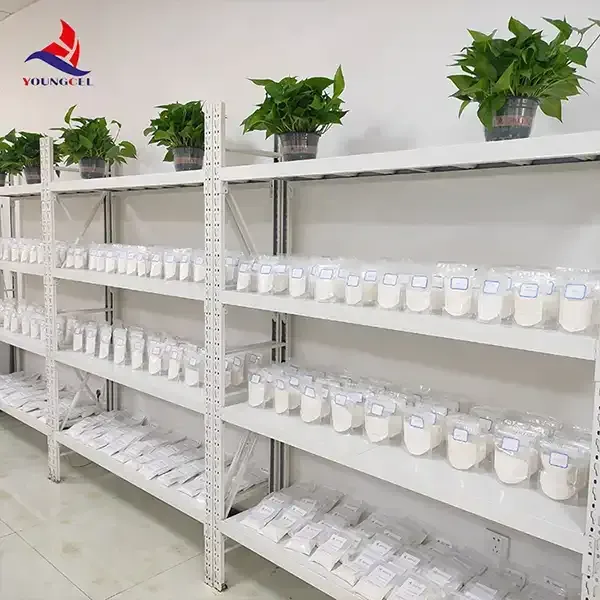HEC Cellulose An Overview of Its Properties and Applications
Hydroxyethyl cellulose (HEC) is a non-ionic, water-soluble cellulose ether derived from natural cellulose. It is a versatile material widely used across various industries, including pharmaceuticals, food, cosmetics, and construction. This article delves into the properties of HEC, its synthesis, and its numerous applications, highlighting its significance in modern technology and everyday products.
Properties of HEC Cellulose
HEC is known for its excellent thickening, gelling, and stabilizing properties. It is a white to off-white powder that is soluble in cold and hot water, forming a clear, viscous solution. One of the standout features of HEC is its ability to form a gel upon cooling, which is valuable for a range of applications. It maintains its stability across a wide pH range, making it suitable for both acidic and alkaline environments.
In addition to its thickening properties, HEC is also a film-forming agent. This enables it to create transparent films, making it ideal for use in coatings, adhesives, and personal care products. Its non-toxic and biodegradable nature makes it an attractive alternative to synthetic polymers, appealing to environmentally-conscious consumers and manufacturers.
Synthesis of HEC
HEC is synthesized through the etherification of cellulose with ethylene oxide in the presence of a catalyst. The reaction involves substituting hydroxyl groups in cellulose with hydroxyethyl groups, resulting in a polymer with varying degrees of substitution. The degree of substitution affects the solubility and viscosity of HEC, allowing manufacturers to tailor the properties of the final product for specific applications.
The process can be optimized to produce different grades of HEC, each with unique characteristics. For example, some grades may exhibit lower viscosity, while others may be designed for enhanced water retention. This versatility is one of the reasons why HEC has gained popularity in multiple industries.
hec cellulose

Applications of HEC Cellulose
1. Pharmaceuticals HEC serves as a thickening and stabilizing agent in pharmaceutical formulations, such as suspensions and gels. It enhances the bioavailability of active pharmaceutical ingredients by improving their dispersion in liquid formulations. Additionally, HEC is used in controlled-release drug delivery systems, allowing for a gradual release of medications over time.
2. Cosmetics and Personal Care In the cosmetics industry, HEC is a popular ingredient in products such as lotions, creams, and shampoos. Its ability to provide a smooth texture and enhance the viscosity of formulations is highly valued. Moreover, HEC acts as a film-forming agent in products like hair sprays and gels, providing long-lasting hold and shine.
3. Food Industry HEC is utilized as a food additive, primarily as a thickener and stabilizer. It helps improve the texture of sauces, dressings, and dairy products while also acting as a fat replacer in low-fat food formulations. The use of HEC in food products is recognized for its ability to enhance mouthfeel without compromising taste.
4. Construction In the construction industry, HEC is an essential ingredient in cement and plaster formulations. It improves the workability and adhesion of mortar and enhances the water retention of cementitious materials. This leads to better performance and durability of construction materials.
5. Adhesives and Coatings HEC is widely used in the production of adhesives and coatings due to its thickening and film-forming properties. It provides excellent durability, flexibility, and resistance to environmental factors, making it suitable for a variety of applications, from woodworking to automotive coatings.
Conclusion
HEC cellulose is a multifunctional polymer that plays a critical role in numerous applications across diverse industries. Its unique properties, such as water solubility, thickening ability, and film-forming capability, make it an invaluable ingredient in pharmaceuticals, cosmetics, food, construction, and more. As the demand for sustainable and biodegradable materials continues to grow, HEC cellulose stands out as a natural alternative to synthetic options, reinforcing its position as a key player in the evolving market of specialty chemicals.
-
Rdp Powder: Key Considerations for Wholesalers in the Building Materials IndustryNewsJul.08,2025
-
Key Considerations for Wholesalers: Navigating the World of Hpmc - Based ProductsNewsJul.08,2025
-
Hpmc Detergent: Key Considerations for WholesalersNewsJul.08,2025
-
Key Considerations for Wholesalers: China Hpmc For Tile Adhesive, Coating Additives, Concrete Additives, and MoreNewsJul.08,2025
-
Crucial Considerations for Wholesalers: Navigating the World of Construction MaterialsNewsJul.08,2025
-
Key Considerations for Wholesalers Sourcing Additive For Cement, Additive For Concrete, Additive For Putty from Additive Manufacturer Shijiazhuang Gaocheng District Yongfeng Cellulose Co., Ltd.NewsJul.08,2025




